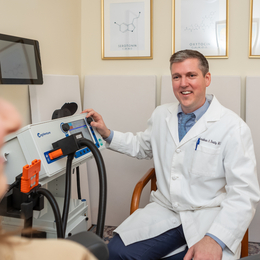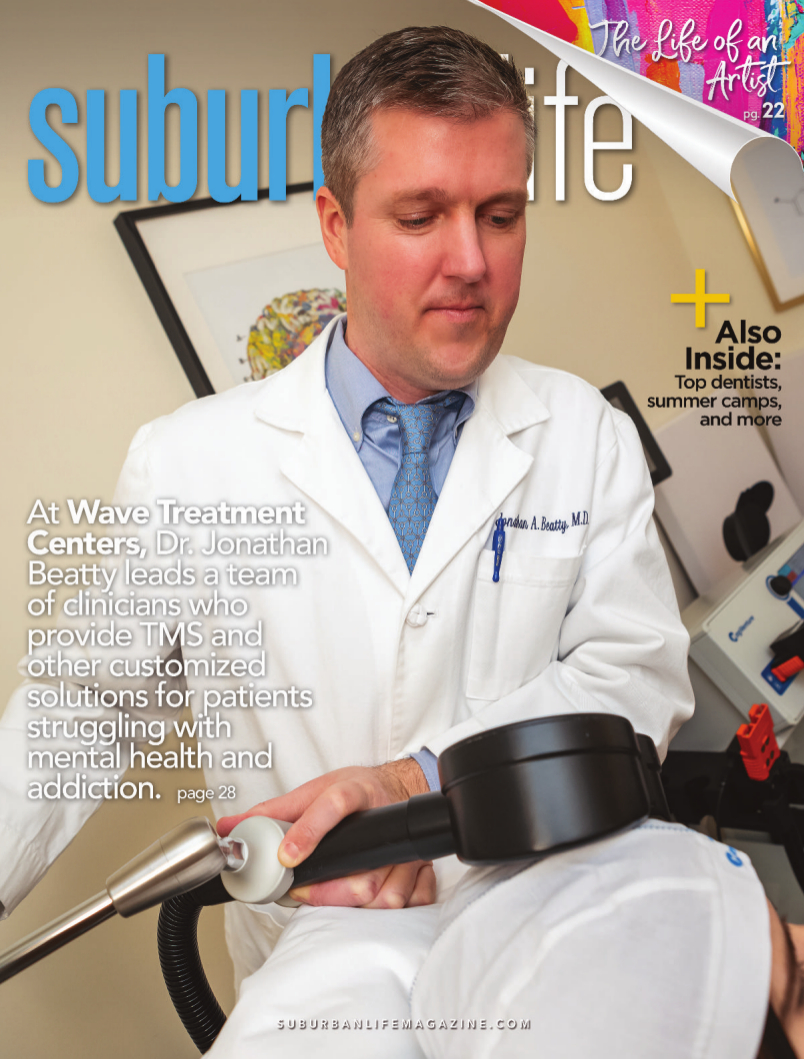
Wave of Progress
At Wave Treatment Centers, Dr. Jonathan Beatty leads a team of clinicians who provide TMS and other customized solutions for patients struggling with mental health and addiction.
“It’s the last frontier in the human body.”
As someone who was always fascinated by the central nervous system and human behavior, Jonathan Beatty, M.D., considered psychiatry the perfect career choice. The ability to push the envelope in the field, to embrace emerging modalities, and to truly make a difference for patients suffering from a wide range of disorders has only confirmed that this path was the right one for him to follow.
Triple board-certified in psychiatry and neurology, pain medicine, and addiction medicine, Dr. Beatty is the founder of Wave Treatment Centers, with offices in Chestnut Hill and Center City. The comprehensive practice provides treatment for mental health and addiction recovery that is customized to each patient, thereby enhancing the traditional models of psychiatry.
“I think most people conceptualize going to a psychiatrist’s office as sitting in a chair to discuss their problems,” Dr. Beatty says. “The doctor is going to offer insights and solutions in a talk-oriented fashion—psychotherapy—or in a medication-oriented fashion like prescribing an antidepressant, adjusting the dose and so forth. That is very much still a part of what we do, but there are also more advanced treatments and procedures that are unique to this practice based on our medical backgrounds and training.”
One of those specialized treatment methods is transcranial magnetic stimulation (TMS) therapy. A noninvasive outpatient procedure, TMS is FDA approved to address treatment-resistant major depressive disorder, anxiety, and obsessive compulsive disorder, as well as protocols for Parkinson’s disease and dementia, among others. TMS uses magnetic waves to stimulate the brain; unlike medications, TMS targets specific regions of the brain to deliver the exact amplitude (dose) unique to individual patient physiology.
TMS is administered five days a week for 30 to 36 sessions, with each session lasting about 20 minutes. Often used when traditional approaches to treating depression do not relieve symptoms, it has very high success rates that typically last for six to 12 months, perhaps even longer if monthly TMS maintenance sessions follow the regular treatment. Because not a lot of psychiatrists in the area offer TMS, many therapists refer their patients to Wave Treatment Centers.
“Compared to the list of side effects for medications which are taken daily for months and often years, TMS has very few side effects,” Dr. Beatty says. “Some people report a mild headache after the treatment that usually goes away within an hour, and sometimes people notice some scalp sensitivity where the treatment took place.”
Wave also offers ketamine to treat depression, as well as esketamine—brand name Spravato—which is an intra-nasal spray administered in an office setting, with constant monitoring of the patient, measuring blood pressure and other vital signs. Both can produce rapid benefits, sometimes within one or two treatments.
Before starting his independent practice, Dr. Beatty was on the faculty of Thomas Jefferson University and was then recruited to work for a national addiction center to head its residential treatment facilities in the Northeast; helping patients with addiction to alcohol, opiates, and benzodiazepines continues to be a major focus of his. Wave stands out in this realm by providing long-acting injectable medications and offering an outpatient detox program with medically assisted withdrawal.
“Many people don’t want to go away from their home and family for detox, either psychologically speaking or for logistic reasons, like if they have pets they need to care for or they can’t miss work,” Dr. Beatty says. “A lot of times we think of addiction as something that affects people who aren’t working, but in this practice the majority of our patients are high functioning. With outpatient detox, they don’t have to miss work or notify their employer. We can avoid that altogether and have them stay in the comfort of their home in a safe way, with minimal disruption to their life.”
Whatever reason someone is visiting Wave Treatment Centers, they can expect a caring and empathetic staff that additionally includes a full-time physician assistant and a part-time psychotherapist. With the national conversations about mental health and addiction changing and more people seemingly willing to seek help, Dr. Beatty and his entire team are happy to assist in any way they can.
“I’m encouraged that people are seeking care,” he says, “and I’m appreciative that I’m able to be a part of that journey and can help them get through that suffering and come out the other end usually much better than when they started.”
For more information about Wave Treatment Centers, which has offices in Chestnut Hill and Center City, call (215) 242-0420 or visit wavetreatmentcenters.com.
Photo by Nina Lea Photography
Published (and copyrighted) in Suburban Life magazine, January 2024.



